She’s not done yet Commodore Nation! Kailia will be wrapping up the 2023-24 season at the NCAA Championships in Athens in ✌️ weeks. 😤😤#AnchorDown pic.twitter.com/IJ4YPJJvLF
— Vanderbilt Swimming (@VandySwimming) March 6, 2024
A Ripple in Time
by Graham HaysWhen not making history in the pool, swimmer Kailia Utley looks to increase our understanding of the ancient world
Kailia Utley will compete in the 100 and 200 butterfly in the NCAA Women’s Swimming and Diving Championships, March 20-23 in Athens, Georgia. She is the first Commodore in more than three decades to qualify for the championships. Earlier this year, VUCommodores.com profiled Utley’s passion for the ancient world, which took the classics major to Greece last summer.
NASHVILLE, Tenn. — Don’t let the endless loop of pool laps fool you: Swimming can take you places. In Vanderbilt junior Kailia Utley’s case, it can even help propel you several thousand years into the past.
This summer, a few months after she climbed out of the pool at the end of her successful sophomore season with the Commodores, Utley swam each day in the more expansive waters of the Aegean Sea. During a three-week stint as an undergraduate research assistant for an archaeological project led by Associate Professor of Classical and Mediterranean Studies Joseph L. Rife, she worked near the ancient port city of Kenchreai, Greece, sifting through fragments that told a story of everyday life more than 2,000 years ago.
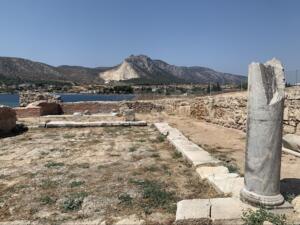
Ruins near the ancient port of Kenchreai (courtesy Kailia Utley).
Utley is drawn to retracing the steps others once took. In doing so, the record-setting SEC student-athlete and double major in classical and Mediterranean studies and medicine, health and society explores paths few ever thought to travel. The same fascination with the smallest details that drive her to go faster in the pool carried her to the shores of the Aegean in pursuit of knowledge. That curiosity may one day reshape our understanding of the ancient world and the people who called it home.
“When you’re studying, you imagine all these things you read about.” Utley said. “I feel like I’m a very visual person—I have these pictures in my head of what I think something is going to look like and what I think these people did. And then when you get there, you actually look at something that someone else held. It’s really almost kind of spiritual in a way.”
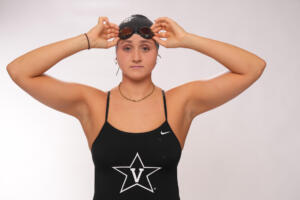
Utley’s academic and athletic passions share a long history. Even Plato’s Laws mentions swimming. To illustrate a point, the philosopher paraphrased an apparently common putdown of the time, noting that “they spell not neither do they swim”—essentially equating an inability to swim with general cluelessness in life. Utley’s roots in the sport, though, are strictly modern. Her mom, Kathy, swam for the University of Arizona and worked for many years as a lifeguard near their Southern California home. Kathy’s daughter followed in her wake, so to speak, as a lifeguard and accomplished collegiate swimmer.
“It’s so meticulous, and I kind of like things that are really meticulous,” Utley said of what keeps her in the pool. “Changing the tiniest of angles of your arm, your stroke, where you pull the water, how you come out of the water, your kick count—there are so many little things you can change and focus on getting better at. There are so many ways to improve and so much about it that’s hard, and I love that part of it.”
Pacific Ocean to the Mediterranean world
Falling in love with the ancient world was more serendipitous. She attended Mater Dei High School in Santa Ana, California—a renowned athletic power and alma mater of the likes of NFL No. 1 pick Bryce Young and Vanderbilt women’s basketball director of player development and WNBA star Katie Lou Samuelson. The Mater Dei Swimmer of the Year and a state champion in the 100 butterfly as a senior, she more than held her own amid a student body of athletic overachievers. But in studying Latin at Mater Dei, she also found herself drawn to people well beyond her peer group. Each lesson included a section on the culture of the ancient world, and she happily lost herself in the descriptions of vendors engaged in commerce in the marketplace or armorers outfitting the legions. Far from being a dead language, Latin brought a world alive.
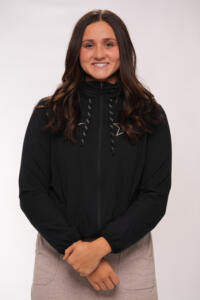 “I fell in love with the meticulousness of the language and just how old it is,” she explained. “We would read tombstones and inscriptions, and you get to be a teeny bit more a part of that world that used to be. The language—that’s what they spoke, what they wrote in.”
“I fell in love with the meticulousness of the language and just how old it is,” she explained. “We would read tombstones and inscriptions, and you get to be a teeny bit more a part of that world that used to be. The language—that’s what they spoke, what they wrote in.”
Plenty of schools were interested in offering her a place to swim. But in addition to wanting to follow a premed track, she sought a school that also offered a classics major. In a sign of the times in liberal arts, many offered a handful of related classes, but far fewer offered full majors. At Vanderbilt, she found the best of both worlds: SEC competition and classical and Mediterranean studies.
She wasted no time making the most of the opportunity. Just a week into her first college season, she won the 200 butterfly in a meet against Florida Gulf Coast. She went on to set the school record in the same event during the SEC Championships and earned a place in the CSCAA National Invitational Championship—Vanderbilt’s lone representative. She was equally precocious out of the pool. Part of the First Year SEC Academic Honor Roll and second-team honoree as a CSCAA Scholar All-American, she participated in a Maymester archaeological dig led by Rife and affiliated with the Caesarea City and Port Exploration Project in Israel.
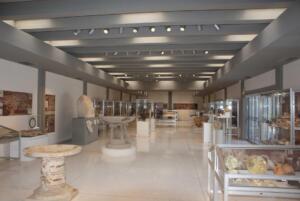
Inside the Archaeological Museum of Isthmia, where Utley worked (courtesy Kailia Utley).
An opportunity in Greece
This past spring semester, she worked with Rife in Nashville on research related to human bones discovered in a cemetery near Kenchreai. She jumped at the chance when he mentioned an upcoming opportunity for related work in the field. Alongside three other undergraduates and Rife’s research team at the Archaeological Museum of Isthmia, she spent much of her time studying pottery shards related to the commerce once conducted around the harbor. The museum is home to a large collection of a specific type of amphora, the Late Roman Amphora 2, and by piecing together fragments to measure the rim height and diameter, researchers can gain a better sense of original size and what the object might have held.
“Something that is also really cool is that you can find fingerprints on these big amphoras, these big jars to hold liquid,” Utley said. “You find full fingerprints that have been pressed into this terracotta and have been sitting for thousands of years. You’re holding something that someone else held forever ago, and it really helps bring it to life.”
Beyond the rush of connecting with people across millennia, the fingerprints offer an opportunity to advance knowledge. Through modern fingerprint analysis, it may be possible to recreate patterns of life as the same fingerprints follow routes of commerce and interaction around the Mediterranean.
“How many did they make?” Utley said. “Where did they go? Where did they come from? How far did they travel? It really helps to piece together that whole picture, which is interesting.”
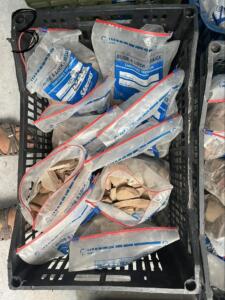
An example of the materials Utley catalogued (courtesy Kailia Utley).
The future of the ancient world
The questions hint at how Utley hopes to meld her passions. It might be tempting to think of her premed studies as the practical plan for her future, while her work in classics feeds pure intellectual curiosity. But as she continues to explore the disciplines, modern science—and even modern medicine—can serve as tools to better understand ancient civilizations and those marketplaces she used to stroll through in her mind as a high schooler.
She has learned about a former student, now a surgeon, who studied ancient religion. In learning more about belief over the centuries, in whatever form it takes, they found ways to better aid patients in the mental aspects of recovery. Other former students entered fields related to paleopathology, using bones and other fossil materials to learn more about ancient disease and the implications it may have for current society. One study of teeth from a burial site near Athens, for instance, yielded DNA that researchers used to link a deadly plague in the fifth century B.C.E. to typhoid fever.
In addition to learning more about the specialized skills involved in the fingerprint research, she intends to use her time at Vanderbilt to bring together her majors through her minor in disability studies. Perhaps as an honors thesis or independent study, she hopes to “look at everyday life in the ancient world through the lens of someone with a disability.” In particular, she is interested in how physical disabilities shaped experiences in a society centered on walking.
As Plato’s swimming aside suggests, it was not necessarily a welcoming world.
First, or at least concurrently, a new swimming season nears. In two of her final races a season ago, Utley achieved career-best times in the 100 fly in the SEC Championships and the 200 fly in a subsequent meet at Tennessee. There are always more tenths of a second to trim with some tweak to arm angle or kick count. It’s always some small detail that unlocks the biggest of prizes.
She swims on because the future awaits. And in her case, so does the past.

